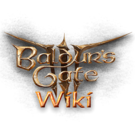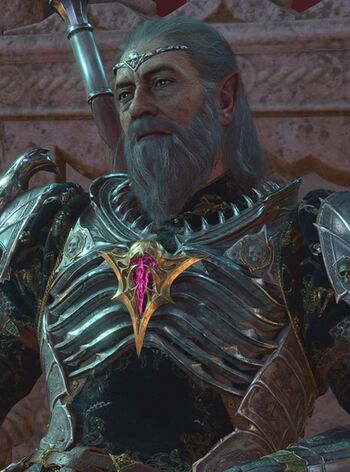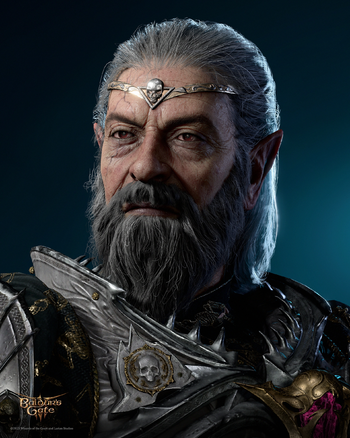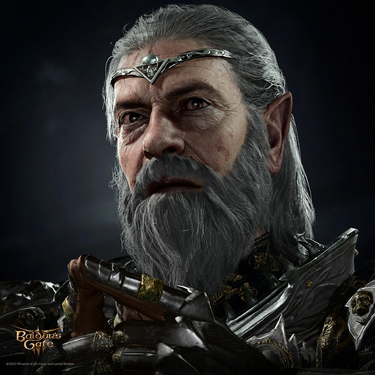More actions
| Ketheric Thorm | |||||||
|---|---|---|---|---|---|---|---|
| Stats | |||||||
| Level 11 | |||||||
| |||||||
| Undead, formerly half-elf | |||||||
| Undead | |||||||
| 188 | |||||||
| 22 | |||||||
| 9m / 30ft | |||||||
| Medium | |||||||
| 75 kg / 165 lbs | |||||||
| +4 | |||||||
| +1 | |||||||
| Conditions | |||||||
|
| |||||||
| Passive features | |||||||
| Resistances | |||||||
| Character information | |||||||
| Class | |||||||
| Location | Moonrise Towers Mind Flayer Colony | ||||||
| Faction | Cult of the Absolute | ||||||
| Family | Melodia (former wife) Malus Thorm (uncle)[1] Gerringothe Thorm Thisobald Thorm Isobel Thorm (daughter) | ||||||
| Allies | Myrkul, Enver Gortash, Orin the Red, Balthazar, Z'rell | ||||||
| Enemies | Dame Aylin, Jaheira, Halsin, Harpers, Shar, Selûne | ||||||
| Additional information | |||||||
| Voice actor | J.K. Simmons | ||||||
| Model | |||||||
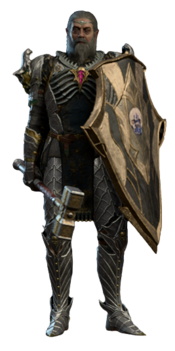
| |||||||
| Overview | Combat |
Spoiler warning: The following content contains unhidden spoilers for Act 2. |
General Ketheric Thorm is one of the Chosen of the Absolute, the enigmatic cult taking over the Sword Coast, and serves as one of the main antagonists in Baldur's Gate 3.
Once the governor of Reithwin Town, personal disaster and grief drove him down the path of darkness and violence, eventually being defeated in battle a century ago by the combined forces of the Harpers and druids of the Emerald Grove. Now, risen from the grave to lead the Absolute's forces as their general, he seeks to destroy Baldur's Gate and spread the cult of the Absolute.
| “ | I'll tell you a story, True Soul. About a man who sold himself piece by piece. |
„ |
| — Ketheric Thorm |
Overview
Background
Risen from the grave a hundred years after the events that lead to his downfall, Thorm serves as the main antagonist of Act 2 of the game, being introduced during Act 1 through dialogue and in-game notes first. As the party searches for ways to cure their tadpole situation, many clues point towards Moonrise Towers and Ketheric himself and the party is ultimately tasked with bringing Ketheric down in order to rid the Shadowlands from its curse.
Through battle with him, and later exploring the Illithid colony under the stronghold, the party discovers there's something more perverse going on with the tadpoles in their heads. Ketheric's alliance with Enver Gortash and Orin the Red is also exposed, and in the process of the fight against him, it's revealed that it was Myrkul that brought Ketheric back from the dead. With Thorm dead, the party now have one of the Netherstone that power the trio, and the clues to their next destination: Baldur's Gate.
Gameplay
- Ketheric is an Undead that retains some features of his past life as a Half-Elf
- He can be found throughout Act 2, while being referenced through dialogue and notes in Act 1
- In combat, he's most similar to an Oathbreaker paladin, able to cast a form of Smite with his attacks, as well as having access to Aura spells and able to raise Undead minions
- Despite his status as a boss, Ketheric can still be disarmed, knocked prone or affected by other types of weapon abilities
- True to his skill as a general, Ketheric commands his allies to focus their attacks on targets he deems especially dangerous via Deadly Orders
- The outcome of the quests relating to the Nightsong, as well as dialogue checks, can influence the encounters with him
Quests
Personality
Ketheric Thorm is best described as a man broken by grief.
Isobel speaks of a loving, doting father while she was growing up, one who had the admiration of his subjects for being just and fair, full of love for his wife who he adored more than anyone else. Tragedy, however, would turn him into a bitter, wrathful man, willing to cleanse Reithwin from any Selûnites just to spite the Moonmaiden for abandoning him.
Whatever the man he once was, the Ketheric the party encounters is a callous one, evident by his dismissal of Minthara and the goblins, ordering their torture and execution for failing him. Though courteous when needed, he will quickly condemn the party to death should they defy his orders. Above all, however, he is relentless in his pursuits, willing to burn the entire world just to be reunited with his daughter.[2]
Though he changed his patron god thrice, he proved to be an ardent believer of each: for Selûne, he built Moonrise Towers in her honor, for Shar, he built a grand temple under town in her name and for Myrkul, he amassed a great army ready to raze Baldur's Gate to the ground.
Through it all, he kept a note from Isobel close to him,[3] showing that deep down a small part of him still remembers the man he once was.
History
A devout worshipper of Selûne, Thorm lived with his wife Melodia and daughter Isobel near the town of Reithwin as governor of the region. Such was his devotion to the Moonmaiden that he would commission a local mason to construct a grand bastion in her honor: Moonrise Towers. Yet disaster struck the Thorm family when Melodia passed away, leaving Ketheric to raise their daughter alone. With a child in his care, Ketheric persevered, and though doubts plagued his mind, he never abandoned the Selûnite ways he would raise his daughter in. It wouldn't be too long after, however, that tragedy would befall Ketheric once more, this time with Isobel dying.
Grief-stricken and unable to cope with her loss, he renounced the worship of the Moonmaiden and turned to Shar, the Lady of Loss. In his downward spiral into darkness, Shar compelled him to build an army of dark justiciars beneath his home town in order to cleanse the world of Light. Moonrise Towers, once a bastion of Light, turned into a symbol of darkness and grief, and Thorm would systematically erase all Selûnite trace of the town, forcing all believers of the Moonmaiden to convert to Shar or flee. Those who remained devout to Selûne did so in secret, arranging a fledgling resistance.
At some point, Ketheric would trick his daughter's lover, Aylin and trap her in a prison, made to serve as a perpetual sacrifice for dark justiciar initiates. Reithwin soon became the site of battle between Ketheric's army and the combined forces of the Harpers and druids of the Emerald Grove.
In the end, the Sharran army was defeated, Ketheric himself perishing along with them. Yet, before the final blow was struck, he would curse the lands with a terrible darkness that would persist long after his demise, afflicting any survivors from the battle and all the inhabitants left. His body was buried in the Thorm mausoleum.
Years later, Thorm would be brought back from the dead by Myrkul, tasked to form an alliance with the apostles of the other two of the Dead Three and bring death to the world in exchange for bringing his daughter back. Not long after, he would set out to revive his daughter Isobel with help of Balthazar, though his plan at a family reunion failed when she saw his broken visage after being revived, fleeing from him. Empowered by Myrkul, and granted immortality by the Nightsong, Ketheric begins amassing an army of followers of the Absolute in order to march to Baldur's Gate and sow destruction.
Tasked with the recovery of the mysterious artifact, the only object capable of thwarting the Dead Three's plans, he ultimately fails and falls at the hands of the party who kill him for good.
Interactions
Though the party learns about Ketheric during Act 1, his involvement in the cult of the Absolute is only explored during Act 2, allowing them to meet Ketheric himself in Moonrise towers before or when it's sieged.
Act Two
Moonrise Towers throne room
The Party's first encounter with Ketheric Thorm starts with the general judging the members of the Absolute's forces from the Goblin Camp, including Sazza, Fezzerk, and Minthara if any of them are still alive. Should Minthara be alive, he will send her to the dungeons to be punished, and is left with the goblins, who attack him out of fear. Even when impaled, or nearly decapitated with a halberd, he shrugs off the wounds as if they were minor annoyances, killing one of the goblins as punishment. He will leave the fate of the rest of the goblins to the player.
Players can visit him before the finale by simply visiting on the top of Moonrise Towers. Attempting to go through the door that leads to him will make everyone around it hostile.
While speaking to NPCs such as Jaheira, Z'rell, and Balthazar, it will be revealed, to some capacity depending on who you speak of, that a magical relic grants Ketheric immortality. Assisting Balthazar will reveal that sometime between his life as a Sharran, and his time serving Myrkul, Ketheric Thorm had discovered the Nightsong, and used it to render him unkillable.
Atop Moonrise Towers
The party may encounter him again at the top of Moonrise Towers during the siege and are granted a quick exchange with him before combat. Should Isobel be dead, he will recount his life story, and his sacrifices, blaming the party for her death, but not punishing them, as he wishes to keep up the façade of the Absolute's judgement. If Aylin was saved, she will interrupt the conversation and combat will soon begin. Otherwise, the encounter begins as normal. Once his health drops to around 25%, Ketheric will flee down into the Mind Flayer Colony, with the players giving chase.
If, however, the player chose to let Balthazar take the Nightsong in the Shadowfell, Ketheric will offer the player to pray at the altar of the Absolute. Doing so will skip the fight at the top of the tower and the player will instead end up imprisoned in a pod in the Mind Flayer Colony where Balthazar is tasked with recycling the party into zombies and retrieving the Mysterious Artefact. The player then needs to break out of the pods and defeat Balthazar in order to continue.
Eventually, the party finds Ketheric having a conversation with Enver Gortash and Orin the Red, revealing the true form of the Absolute and their true power. The party will then engage Ketheric once more and when he falls, the last portion of the fight will begin, this time against the Apostle of Myrkul.
If the player passes multiple Persuasion and/or Intimidation checks both atop Moonrise Towers and in the Mind Flayer Colony, asking him to repent, the first half of his fight in the Mind Flayer Colony will be skipped as Ketheric gives himself to Myrkul.
Defeated for good, Ketheric's body will contain the first Netherstone.
Combat
Ketheric serves as the main antagonist of Act 2 of the game and must be fought thrice in it. His defeat marks the end of the act and, upon it, the party is free to go to their next and final destination: Baldur's Gate.
Loot
Dialogue
This page is in the process of being constructed or reformatted. You are welcome to contribute as well. Last edited on 2023-12-13. If multiple days have passed since, this template should be removed. |
Gallery
Related literature
Notes
- His invulnerability is removed by completing the Shadowfell portion of the Find the Nightsong quest. Until completed, Ketheric is unkillable.
- If disarmed during the first encounter on top of Moonrise Towers, and he's not given the chance to pick his weapon up, Ketheric will wield a
 Flail of Myrkul for the next phase.
Flail of Myrkul for the next phase. - A note written by Malus found in the House of Healing refers to Ketheric as nephew[1], thus it can be safely inferred that Malus is indeed his uncle.
- It's unclear what degree of kinship Ketheric and Gerringothe share. It can be presumed she's his aunt following Malus' situation, however, notes and narration mention that Ketheric dug up many of his ancestors tombs, which could indicate she could be a far older relative if necromancy was practiced on the corpse too.
- Ketheric's kinship with Thisobald is not quite clear, either. Though Thisobald refers to Ketheric as "father", neither Ketheric nor Isobel ever acknowledge him in dialogue or otherwise. Given that Ketheric and Balthazar have desecrated the Thorm mausoleum and resurrected Isobel, it's possible that Thisobald is another resurrected relative and refers to Ketheric as father not in the paternal sense, but as "creator".
- Ketheric's method of immortality derived from the Nightsong isn't clearly explained in the game. The Nightsong mentions being taken captive shortly after the death of Ketherics daughter, and being used as the sacrifice for the dark justiciar initiates employed by Thorm. Given she hasn't been moved in over a century, it can be assumed that Ketheric enjoyed the same immortality back then as he did in the present, however, if that were the case, it's unclear how he was able to be defeated in the first place.
